- Home
- Taylor Caldwell
Time No Longer Page 4
Time No Longer Read online
Page 4
“Then, in the very center of the whirlpool of sparks I saw three enormous human figures, naked and motionless. I could not remember the exact moment I became aware of them, for when I actually did become aware of them I felt a shock of horror. I could not see them very clearly, for through their bodies I could see the opposite terrain dimly, as though they were made of glass. I cannot even tell you if they were white or black. I can only say that they were enormous and human, and had the most dreadful expressions that can be imagined.
“They were smiling. And yet, as I think of it, I cannot say in what particular their expressions were so dreadful. They were bending their heads towards us, as though to see us more easily through the shifting whirlpools of red sparks. Perhaps it was their immobility that was so horrible. I do not know. But I know what it means when it is said that a man’s soul swoons with dread, and with a fear greater than the fear of physical death. I felt that in these phantoms was an unnamable loathsomeness and evil and danger; they were the visible signs of those unnamed ferocities and horrors which are fixed eternally beyond the borders of our ‘reality.’
“My sensations were indescribable. I was petrified in a sort of hypnosis; I lost consciousness of the other human beings beside me. Only I, and these awful phantoms, existed in a vacuum of hell. I became aware of eternity and wildness and despair and complete terror. I became aware of unreality, and knew it was the only reality.
“Some one shouted, or rather yelled. I did not know that it was myself, until I heard an angry confusion about me, and saw all the priests glaring at me. But I was too frightened to care. The phantoms and the sparks had disappeared, and there was only the empty ring of stones. I examined them. They were smoke-blackened, but cold. There was no sign of any fire at all.”
Karl said thoughtfully: “Mass-hypnosis, of course.”
“Mass-hypnosis!” cried Eric with impatience. “What do you mean by mass-hypnosis? It is a strange, and even terrible thing, that men dispose of mysteries with a word, pin a phrase upon the inexplicable, and go away, smugly, feeling that meaningless words have solved eternal puzzles. But under the little pink ribbons of words the mysteries still go veiled. Mass-hypnosis! What is mass-hypnosis? I know! I’ve spoken about it often in my stupid complacence in my own classrooms. ‘Influence of one powerful mind on a mass of weaker ones.’ But what is that influence, how does it operate, how can it work without visible sign?
“I grant you that it was ‘mass-hypnosis.’ But I am also sure that the hypnosis was produced by the phantoms I saw. Evil is always stronger than good; I have yet to see any sort of hypnotism except in medicine, used for a good purpose. Hypnotism works best when the hypnotizer is evil, and the subject disposed to evil more than to good.” He paused, then continued in a changed voice: “The influence of the prophets and the saints and the saviors has been very long in the world. Yet one man, like Hitler, like Mussolini, can, with his ‘mass-hypnotism,’ undo in one hour what these prophets and the saints and the saviors have labored to do for centuries. This proves, without a doubt, that men are disposed to evil, and evil leaders can hypnotize them easily. This proves that evil is the most powerful thing in the universe, when that universe becomes conscious. The things I saw in that jungle in Africa were pure evil, and could be made manifest by the slightest invocation.”
Karl was silent for some moments, then he said: “If this is true, and it may be true, then it is a good thing that men think very little. If they thought much, and realized, they would all go mad.”
Eric smiled wryly. “It is paradoxical, but perhaps it is man’s inability to think which has made civilization possible!”
Karl said nothing. Eric waited, but his adopted brother did not speak. So after a few minutes the younger man produced other articles from the box and spoke of them, in a somewhat flat voice. Karl listened, but it was evident that his thoughts were not centered on what Eric was saying. He came to with a start. Eric was showing him three little doll-like images of wood, crudely carved, but all alike. Eric was saying smilingly: “You see how it is? You ‘baptize’ each creature with the name of your detested enemy. You must believe in the baptism, and it must be done most solemnly, with concentration. Then the creature does in fact become your enemy, mysteriously his own image. After this, he is in your power. Then, you do so:” and he picked up a long prong, like a brass nail, and thrust it into the body of the carved image. “At any spot you desire. Slowly. The wood is soft. You drive it in a fraction each day; the natives say it is better so: the enemy suffers.”
“Does it work?” asked Karl, teasingly.
“Yes, it does,” said Eric, without a smile. “I have seen it done. Many times. It always worked. The subject suffered slowly, agonizingly, until he died. But he could not die until the nail was driven into a spot that was vital. The torturer sometimes delayed, exquisitely, before administering the coup de grâce. The savage mind is very imaginative.”
“Is it necessary for the unfortunate subject to know that he is being worked upon?”
“No. Though it works quicker and better for him to know. But I have seen men sicken and die without knowing that they were being ‘conjured.’” Eric smiled now. “What explanation have you for this, Karl?”
Karl laughed. “None. I do not believe it. When such a thing succeeds, it must be coincidence. When it fails, the operator probably believes that the ‘magic’ of his enemy is superior to his, or he conveniently forgets.”
A maid brought in a tray with coffee and cakes and the message that the Herr Professor wished to see Herr Erlich at his convenience. Karl nodded, without speaking. Eric was unusually silent as they ate and drank. Then he said, after drinking the last cup: “You are skeptical about everything I have told you?”
“My dear Eric! Is it possible you believe any of the nonsense you have told me? My dear Eric!”
“Of course I believe. But never mind. I shall put all this away, and you need think no more of my idiocy.”
Karl watched him return all the occult rubbish to the box. He hoped he had not offended the younger man. It was very painful for him to offend any one, and especially to offend Eric. He was suddenly depressed.
Eric began to speak about Gerda. He spoke as though he were concealing something, Karl thought. But what nonsense! It was only his own imagination which made him suspect that there was something strange in Eric’s voice. But probably Eric was offended about the magic, still. So, he answered that Gerda was well and sent him her love, and wanted to remind him of the dinner on Saturday. Eric looked, then, at Karl, and seemed about to speak, and then evidently decided not to say anything. Karl had an uneasy feeling that Eric was concealing something about which he had originally wished to speak. I have really offended him, thought Karl remorsefully.
When Karl was about to go, Eric hesitated, then said, not looking at the other: “I have been thinking of going to America, after Gerda and I are married.”
Karl was perplexed. “But I thought you were going to Switzerland on your honeymoon? Can they spare you from the University, all that time?”
Eric put the lid on the box and said in a peculiar tone: “I was thinking of going to America—permanently.”
“Permanently!” Karl was incredulous. “America—but why? Why are you so restless? I cannot believe this! Gerda, I am afraid, would not like America.” Already he was filled with a sense of unbearable loss.
Eric gave him a long thoughtful look, in which there was a touch of compassion. “It is all so tentative, Karl. Perhaps it will never materialize. Shall we forget it for a while?”
But Karl said restively, and with a slight querulousness: “You ought not to annoy me with such ideas, Eric. You and Gerda—it would be hard to see you leave us.”
Eric said nothing. He carried his box to a cabinet and put it away. When he came back he seemed older and quieter, yet more gentle. The energy that always crackled about him was subdued.
Karl went downstairs. He was met at the foot of the stairs by his b
rother. Kurt’s face was ravaged and sunken, as though he had aged five years or more. He regarded Karl with an expression both dogged and pathetic. “Karl, I must talk to you at once. It is extremely important. Will you come into the library for just a few minutes?” His voice was pleading, and he kept opening and shutting his hands as though under a great strain.
Karl, who had greeted Kurt with some diffident coldness, hesitated. He was always pitying his brother, and this pity fatigued him as pity for no one else ever did. He had compassion for all living creatures, for this emotion rose from some tender deep in himself; but for Kurt it was always attended with this tiredness, a reaction which never failed to make him feel ashamed. “Very well,” he said quietly, and followed Kurt into the cool dusky room with its tiers of old leathery books. Kurt had had a high fire built here, for he knew his brother’s sensitiveness to chill. Karl felt a pang at this devoted thoughtfulness, and this pang also made him more tired. Even while his conscience bothered him at the thought, he wished, with some irritation, that Kurt were not always so considerate of him, as he was never so considerate of his wife and children.
He went to the fire, and refused the chair Kurt had drawn to it for him. He stood there, looking mildly obstinate and vaguely futile. Kurt, of course, could not sit down, himself. He stood beside his brother with that dogged and pathetic expression increasing on his face. Karl saw that his forehead was damp, and this made his pity torment him again. But greater than his pity was his embarrassment. He knew that the embarrassment rose from a sort of delicate cowardice: he hated introduction into any one’s business as much as he hated interference in his. And he understood that Kurt was going to talk intimately. Intimacy with Kurt made him uneasy. He tried to overcome all these emotions by a gentle softening towards his brother. “Yes, Kurt?”
Kurt sighed. “Karl, you must not feel so antagonistic to me—”
“I am not antagonistic.” Karl paused, stubbornly, refusing to leave an opening.
“But you are!” Kurt spoke eagerly, approaching his brother more closely. “You are condemning me in your mind for what I said to Eric!”
I shall not get home for hours, thought Karl resignedly. He fixed his eyes upon the other man and did not speak.
“Won’t you let me explain, Karl? I have got to explain! It is so frightfully important. It cannot wait any longer.”
“Are you not being melodramatic? Besides, in all my life I have, never yet encountered anything that could not wait until tomorrow.”
“You ought to have been an Englishman,” said Kurt, with bitterness. “But this cannot wait. Procrastination is not only the thief of time, but of honor.”
“What has honor got to do with all this?”
“The honor of our family.”
Karl shrugged; he tightened his jawbone to keep from yawning. But quickening uneasiness tugged at his heart, and for a moment he saw Eric’s face. What has happened to the world? he thought despairingly. So much emotion! So much tearing about in the mind! So many dramatics! I detest these intense people. He said resignedly: “You are being histrionic. The honor of our family, I believe, is still intact.”
“But it will not be if Gerda marries that—that—if Gerda marries Eric Reinhardt.”
Karl felt his heart plunge sickeningly, but he kept his expression quiet. “I do not understand you,” he said sternly. In spite of his self-control his breath came quickly.
Kurt gave a gesture of despair. “Karl, where have you been sleeping all this time! Is it really possible that you have been so deliberately cloistered? Do you really not know that the day of the Jew is done in the Fatherland, and that he must be exterminated, either by exile or by the sword—?”
“You talk like a fool.” Karl could not keep a quiet violence out of his voice. He paled excessively. “May I ask if you teach this ‘philosophy’ of yours in the laboratory and classroom? If you do, you should be disgraced and dismissed, for the good of your pupils.”
“This is not my philosophy! This is the philosophy of the new Germany. Karl, do you know nothing at all about what is happening?”
Karl’s voice shook for all his efforts: “I refuse to believe that Germans could be guilty of such folly! I refuse to believe that my country has gone mad.” He paused, resumed with effort: “Is this all you have to say to me?” He turned away, as if to leave the room.
Kurt laid his hand on his brother’s sleeve with urgency. His features worked; he seemed overcome with misery and helplessness. Never had he looked so pathetic. But Karl, for the first time in his life, felt no compassion for him. His own lips felt cold and dead and something strangely like hatred fixed his heart into a slow dull beating.
“Karl, whether you will believe or not, whether you know or not, I am telling you what is happening all over the Fatherland. This is just the beginning. I am a member of the Party. Gerda cannot marry this Jew. I shall not allow it. If necessary, I shall appeal direct to the Party leaders. If I have to appeal so, it will do Eric Reinhardt no good. It may even cause his death. I am appealing to you not to force me to this. I—I know your attachment to him.” And an expression of the utmost misery and anger filled his eyes.
Karl regarded him piercingly. He knew then that he was indeed a “futile man of letters.” He had always loathed men who obstinately would not see the truth. He forced himself to see it, and the sight was horrible, devastating to him. A profound shock went all through his body, as though he were dying. His lips turned blue with the excess of his realization, and he wet their dryness.
“What have you done to my country?” he said, almost whisperingly.
Kurt sighed. His face suddenly changed, became fanatical. His eyes glittered, in the leaping firelight. “What have I done? I, and the others, have saved it! What a glorious destiny we shall bring to the Fatherland! What things shall we not do in her name! The world is ours! Crushed, defeated, broken, Germany shall rise and avenge herself! You smile. But you shall change that smile, Karl! You shall see!
“But first of all, we must purify ourselves. We must rid ourselves of the Jew-parasite, who pollutes our blood and enervates us and makes us less than men.”
Incredulous, Karl stared at him. His incredulity had little to do with his brother, but at the things which his brother was conjuring up before him. He could not believe in this dreadful fantasy, this utter madness—and yet, he had to believe. What a world to live in! He had the sensation a man suddenly precipitated into a madhouse would experience. He had the same disorientation, the same bewilderment, the same fear. He forced himself to speak with difficulty: “But what has this imbecility got to do with Eric? Eric, our adopted brother?”
Kurt groaned. “Why will you not realize? Eric is a Jew. And a Jew, in the new Germany, cannot marry an Aryan woman.”
Then Karl suddenly understood what Eric had been trying to tell him when he had spoken obscurely of going to America. He realized everything completely. Eric was emotional and passionate, yet Karl knew that Eric’s acceptance and understanding of this new horror was not hysterical. Eric was never hysterical; his emotion and passion were always merely surface bubbles rising idly from deep unstirred places within him.
Despair overcame him. Eric would go away. He would lose Eric. He would never see Eric again. He was not used to clenching his fists so; the nails entered his thin fine flesh. He could not do without Eric, who was the only one in all the world to whom he could speak and be sure of understanding and sympathy.
Kurt saw his brother’s face, working, twitching, white as death. He saw his eyes, full of wild hatred and repudiation. “Karl!” he exclaimed in a low voice, and took his brother’s arm again. But Karl shook him off.
“You shall not send Eric away! I shall not let you do such a thing, such a foul crime! But you have always hated Eric. I never knew why. But your hating him shall not do this thing to him!”
Kurt turned aside. He spoke with quiet intensity: “Yes, I have always hated him.” He turned back, and his face was contorted. He
raised his voice, literally screamed: “I have always hated him! He turned you against me; he stood between us. He destroyed what ought to have been between twin brothers. I could never come near you; he was always there, with his hateful smile, and his derision. He took you away from me. If I spoke to you, he was there, laughing. He made you despise me. And I am your brother!” He literally sobbed, dryly. “He spoiled my life. I never cared for any one but you. Even when we were children, every one disgusted me, but you. I would have given my life, over and over, gladly, for you! But he made you feel that my life was a silly thing, that everything about me was silly, fit only to be laughed at and ridiculed!”
Karl was speechless; he could hear his own shrill breathing. His nostrils dilated with his rapid breath. He could do nothing but look at his brother, and believe him, and hate him. Never had he been so far from compassion. Always his compassion had been impersonal and detached. A disgusting compassion, he realized now, for it had been tinged with superiority, for all its conscious gentleness. The conscious gentleness of a man of letters, removed from reality, feeling himself above it, and superior to it! He felt a loathing for himself even in the midst of his unbearable agitation and shock and grief and hatred, and terror.
When he could speak, he spoke hoarsely, with enormous difficulty: “You are a fool. No one made you appear ridiculous but yourself. You were always glowering, always suspicious. Eric had but to suggest something for you to oppose it, like a jackass. You were always sullen; pleasantness was unknown to you. You were tedious and tiresome; no one could endure your company, with your sulks and your tantrums. Your jealousy was revolting. You tired me out. Eric was always pleading for you—”

 Testimony of Two Men
Testimony of Two Men Wicked Angel
Wicked Angel The Arm and the Darkness
The Arm and the Darkness Answer as a Man
Answer as a Man Grandmother and the Priests
Grandmother and the Priests On Growing Up Tough: An Irreverent Memoir
On Growing Up Tough: An Irreverent Memoir Ceremony of the Innocent
Ceremony of the Innocent The Listener
The Listener Bright Flows the River
Bright Flows the River The Earth Is the Lord's
The Earth Is the Lord's Dialogues With the Devil
Dialogues With the Devil A Tender Victory
A Tender Victory This Side of Innocence
This Side of Innocence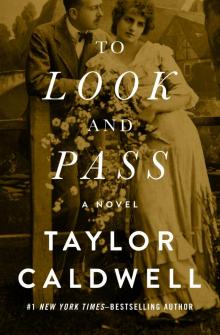 To Look and Pass
To Look and Pass The Strong City
The Strong City Balance Wheel
Balance Wheel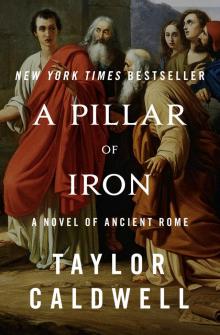 A Pillar of Iron: A Novel of Ancient Rome
A Pillar of Iron: A Novel of Ancient Rome Glory and the Lightning
Glory and the Lightning Dear and Glorious Physician
Dear and Glorious Physician The Wide House
The Wide House The Final Hour
The Final Hour Never Victorious, Never Defeated
Never Victorious, Never Defeated Unto All Men
Unto All Men The Turnbulls
The Turnbulls Your Sins and Mine: The Terrifying Fable of a World Without Faith
Your Sins and Mine: The Terrifying Fable of a World Without Faith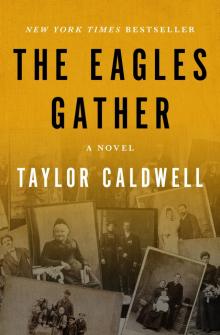 The Eagles Gather
The Eagles Gather Let Love Come Last
Let Love Come Last The Devil's Advocate: The Epic Novel of One Man's Fight to Save America From Tyranny
The Devil's Advocate: The Epic Novel of One Man's Fight to Save America From Tyranny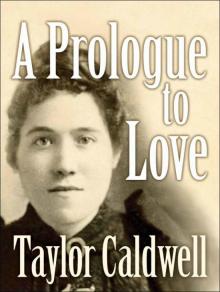 A Prologue to Love
A Prologue to Love Maggie: Her Marriage
Maggie: Her Marriage The Late Clara Beame
The Late Clara Beame Melissa
Melissa Great Lion of God
Great Lion of God Captains and the Kings
Captains and the Kings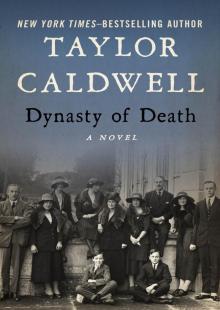 Dynasty of Death
Dynasty of Death No One Hears but Him
No One Hears but Him The Sound of Thunder
The Sound of Thunder There Was a Time
There Was a Time Time No Longer
Time No Longer I, Judas
I, Judas The Devil's Advocate
The Devil's Advocate The Romance of Atlantis
The Romance of Atlantis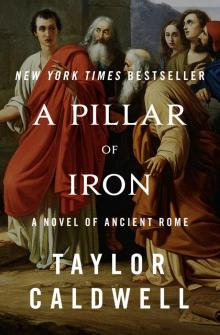 A Pillar of Iron
A Pillar of Iron On Growing Up Tough
On Growing Up Tough Your Sins and Mine
Your Sins and Mine